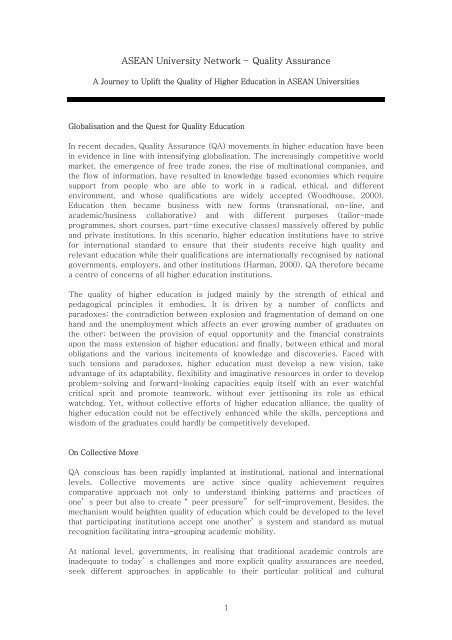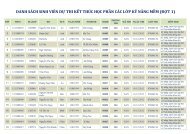qa-cover (1401x1991x24b jpeg)
AUN-QA Guidelines - De La Salle University
AUN-QA Guidelines - De La Salle University
You also want an ePaper? Increase the reach of your titles
YUMPU automatically turns print PDFs into web optimized ePapers that Google loves.
ASEAN University Network – Quality Assurance<br />
A Journey to Uplift the Quality of Higher Education in ASEAN Universities<br />
Globalisation and the Quest for Quality Education<br />
In recent decades, Quality Assurance (QA) movements in higher education have been<br />
in evidence in line with intensifying globalisation. The increasingly competitive world<br />
market, the emergence of free trade zones, the rise of multinational companies, and<br />
the flow of information, have resulted in knowledge based economies which require<br />
support from people who are able to work in a radical, ethical, and different<br />
environment, and whose qualifications are widely accepted (Woodhouse, 2000).<br />
Education then became business with new forms (transnational, on-line, and<br />
academic/business collaborative) and with different purposes (tailor-made<br />
programmes, short courses, part-time executive classes) massively offered by public<br />
and private institutions. In this scenario, higher education institutions have to strive<br />
for international standard to ensure that their students receive high quality and<br />
relevant education while their qualifications are internationally recognised by national<br />
governments, employers, and other institutions (Harman, 2000). QA therefore became<br />
a centre of concerns of all higher education institutions.<br />
The quality of higher education is judged mainly by the strength of ethical and<br />
pedagogical principles it embodies. It is driven by a number of conflicts and<br />
paradoxes: the contradiction between explosion and fragmentation of demand on one<br />
hand and the unemployment which affects an ever growing number of graduates on<br />
the other; between the provision of equal opportunity and the financial constraints<br />
upon the mass extension of higher education; and finally, between ethical and moral<br />
obligations and the various incitements of knowledge and dis<strong>cover</strong>ies. Faced with<br />
such tensions and paradoxes, higher education must develop a new vision, take<br />
advantage of its adaptability, flexibility and imaginative resources in order to develop<br />
problem-solving and forward-looking capacities equip itself with an ever watchful<br />
critical sprit and promote teamwork, without ever jettisoning its role as ethical<br />
watchdog. Yet, without collective efforts of higher education alliance, the quality of<br />
higher education could not be effectively enhanced while the skills, perceptions and<br />
wisdom of the graduates could hardly be competitively developed.<br />
On Collective Move<br />
QA conscious has been rapidly implanted at institutional, national and international<br />
levels. Collective movements are active since quality achievement requires<br />
comparative approach not only to understand thinking patterns and practices of<br />
one’ s peer but also to create “ peer pressure” for self-improvement. Besides, the<br />
mechanism would heighten quality of education which could be developed to the level<br />
that participating institutions accept one another’ s system and standard as mutual<br />
recognition facilitating intra-grouping academic mobility.<br />
At national level, governments, in realising that traditional academic controls are<br />
inadequate to today’ s challenges and more explicit quality assurances are needed,<br />
seek different approaches in applicable to their particular political and cultural<br />
1




